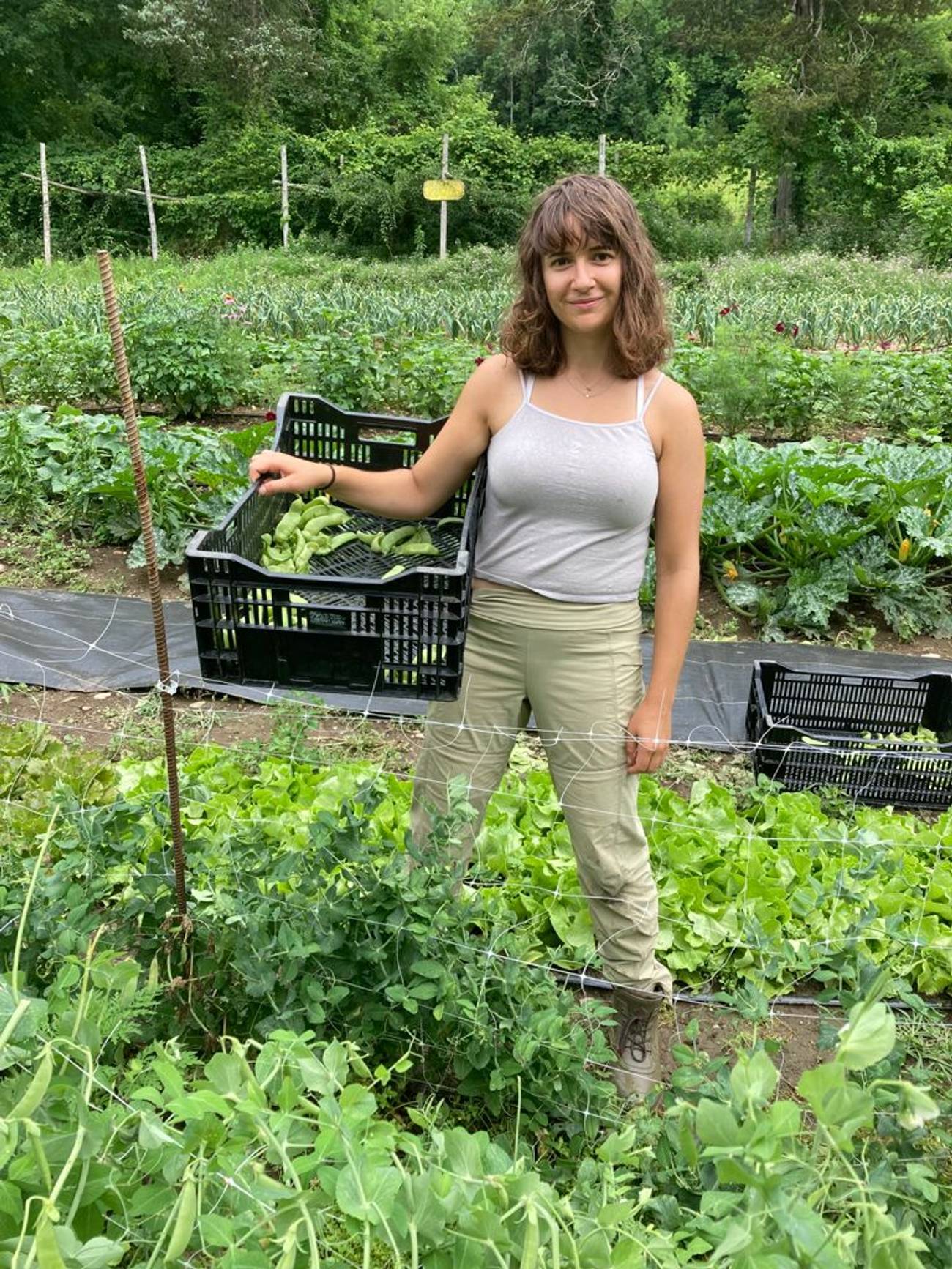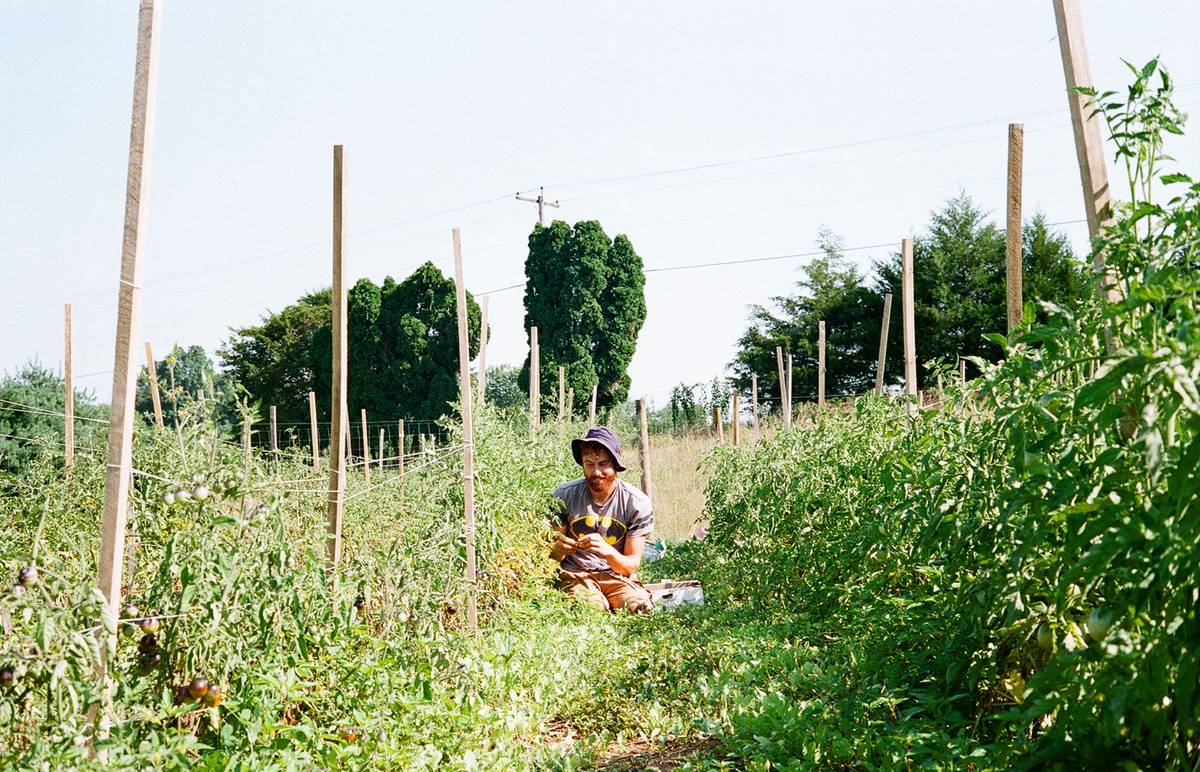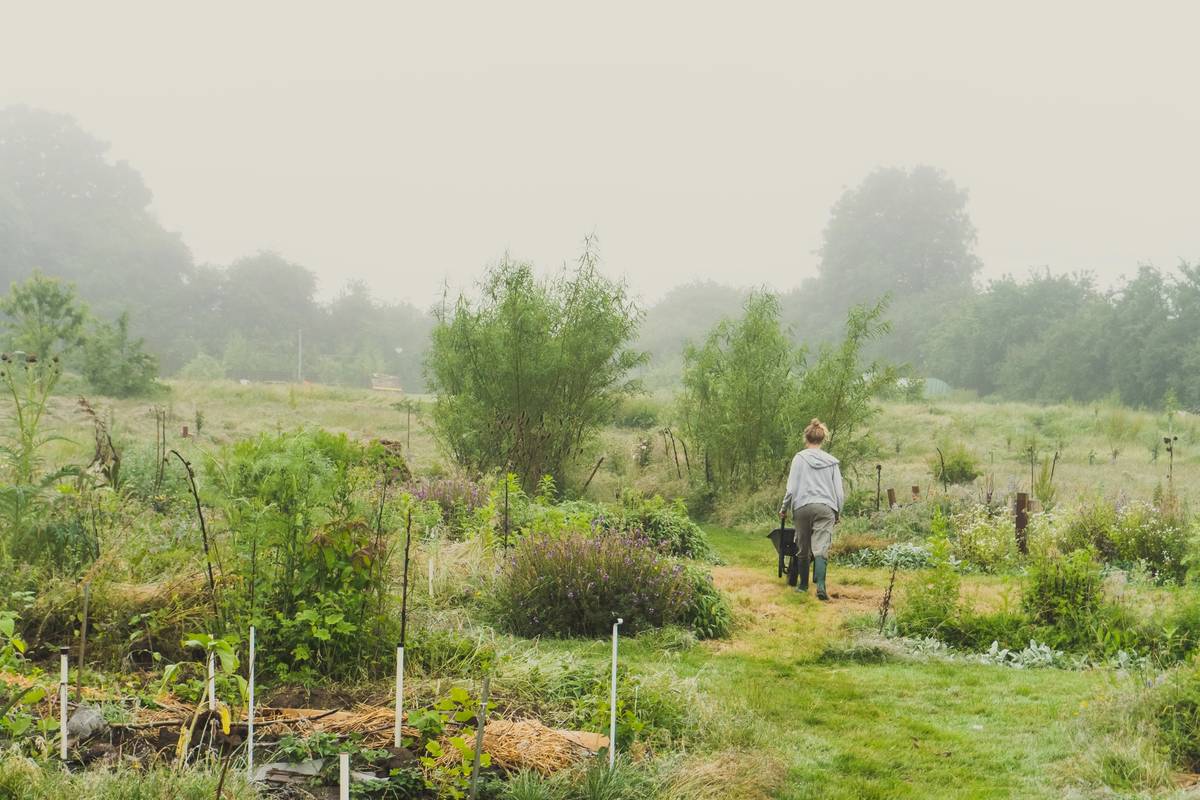Jewish Farming Takes Root
A new generation goes back to the land, seeing new ways to connect to Judaism




Before tending to the vegetables and milking the goats, workers at Adamah Farm in rural Falls Village, Connecticut, start each day with morning prayers. Often the first blessing is “Modeh Ani,” a Hebrew prayer of gratitude recited by the 25-acre farm’s employees as well as visiting members in the Adamah fellowship program—whose graduates have gone on to launch their own farms across the U.S. and in the United Kingdom.
Shamu Sadeh, 52, co-founded the farm in 2003 with Adam Berman, with the help of a $3,200 minigrant from Hazon––an organization focused on nature and Jewish values that has evolved over the years to become “the Jewish lab for sustainability.”
The connection between nature and Jewish values is something that appears to resonate with a growing number of Jews across the U.S. and the U.K., translating into a growing movement of Jewish farmers. Some are more religiously observant than others. Some have been farming all their lives, while others are new to it. The general commonality is that farming connects these Jews––especially younger Jews––with their Jewishness, whether it’s focused on environmental and food activism, more explicitly living the cyclical nature of the Torah, or a combination of all the above.
Young people in general are returning to farm work. One out of every 10 farmers in the United States is under the age of 35, according to a 2017 U.S. Department of Agriculture census. That represented an 11% increase in farmers aged 35 or younger compared to the previous USDA census in 2012. Of these young producers, 80% got started within the past 10 years.
Although this data isn’t broken down along religious lines, it appears that Jewish farmers are on a similar upward trend—for some of the same reasons as their non-Jewish counterparts, and some that are uniquely Jewish. Whether it’s the stewards behind Hazon and Adamah or those working the land at Yesod Farm+Kitchen outside Asheville, North Carolina, and at Sadeh Farm, a Tube ride away from London, they all cite a desire to better connect their Jewishness with their everyday lives. To these farmers, there’s nothing more Jewish than living out the agricultural principles of their biblical and even more recent shtetl ancestors.
Shani Mink was 19 when she heard a rabbi at the Eden Village Camp describe Judaism as one of the oldest Earth-based traditions still being practiced today. The sentiment didn’t resonate with Mink at the time. “The Judaism I grew up in was full of sterile white rooms in a synagogue,” she said. “So that summer was hugely monumental in shifting my understanding of myself, my Judaism, and my relationship with the world.”

Mink, now 27, went on to co-found the Jewish Farmer Network out of a Hazon Food Conference with SJ Seldin of Yesod Farm+Kitchen. The organization started as a Facebook group to give Jewish farmers the opportunity to network, but today it is a driving force in connecting new Jewish farmers—more than 1,000 of them. Its first conference in February 2020 sold out, with over 160-plus Jewish farmers and farm allies from 26 states and three countries. The second conference in January 2021 moved to a virtual setting and grew to 316 attendees across 35 states and six countries.
Perhaps the most distinct aspect of the growing Jewish farmer movement is the fact that these are tangibly Jewish farms founded and operated by people looking for a deeper connection to their Jewishness.
Yisroel Bass, 32, started feeling disconnected from his food when he moved to Manhattan—it was his first time on his own, doing his own grocery shopping. He started to think about how estranged people today are from their food. Bass wanted to break out of what he calls a “solely consumerist role.” He wanted to better understand where his food comes from and to be a part of that process.
But it wasn’t exclusively about getting closer to his food. It was about getting closer to his Jewishness.
“I was looking for more of a connection to that,” he said. From a Jewish perspective, Bass was inspired by a book about the Freeland League for Jewish Territorial Colonization. The movement was founded in 1935 London with the goal of establishing Jewish autonomy in low-density regions across the globe with specific agricultural ideas that spoke to Bass. “I thought to myself, well, what can I do today to kind of go in their footsteps a little bit?” Bass recalled. “Something that’s tangible, serves some kind of a purpose in today’s world?”
That’s how Bass came to the kind of farming that’s going on today across the 227 acres at Yiddish Farm in New Hampton, New York. It’s not just a place of farming, but there’s an office, a kitchen, people coming to the farm, and educational aspects. The farm essentially encompasses all aspects of life, operating predominantly in Yiddish.
The farm no longer offers Yiddish education due to lack of funding, though Bass says the demand is high. Nevertheless, volunteers still come up who want to practice the language on the farm. (Local Yiddish-speaking Hasidim will help out as well.) Bass believes that the Yiddishists who volunteer at the farm are part of a larger movement of Jews looking to develop their Jewish identity.
“I definitely came into farming looking to further embrace my Jewishness,” said Bass, who also farmed at Adamah. “The offseason isolation gave me a lot of time to think about what really matters and what my connection is to God and to our observance and to really work on that and work on davening.”
Over time, Bass developed a practice on his own without anyone standing over his shoulder: Farming, he said, “has provided the space and time to develop a spiritual practice and strengthen my observance.”
Janna Siller, the 39-year-old Adamah farm director and Hazon advocacy coordinator, says that kind of spiritual yearning can be seen across the Jewish world. “There’s a real hunger to understand where our roots are in terms of our relationship to land and how we do that in a way that both honors our ancestry and also takes the wisdom of our ancestors into this moment,” she said. “There’s an awareness that if we don’t lean into those things, we’re all the poorer for it.”
An even more consistent element repeated among Jewish farmers is how farming better connects them to the Jewish calendar, which itself is heavily structured around planting, growing, and harvesting fields. Growing the wheat that will later be used to make the matzo for Passover gives Bass a year-round connection to the holiday. Physical labor also heightens the rest that comes from Shabbat observance.
Justin Goldstein, 41, and SJ Seldin at Yesod Farm+Kitchen differ slightly from the rest of the pack of Jewish farmers in that there’s less emphasis on observance of spiritual practice. That might come as a surprise for those who know Goldstein as Rabbi Goldstein from Congregation Beth Israel, the only egalitarian synagogue in Asheville, where he served as spiritual leader until the end of 2019.
After nearly a decade, Goldstein left the rabbinate and observant life in general. Now he’s a full-time farmer and freelance Jewish educator: “I’m much more interested now in how do we access ancestral Jewish wisdom to help people thrive in their lives?”
This gets to why Goldstein believes younger Jews are becoming interested in connecting their Jewishness with farming. “I think people recognize that there has long been an absence of embodied practice in Jewish religion,” he explained. “The way that we’ve sought in the past to remedy that is with yoga and meditation and Eastern traditions and all these different things.”

Goldstein argues that there’s an element of cultural appropriation in that, which younger Jews are more aware of and sensitive to. He believes that’s why younger Jews are instead turning to their own ancestral wisdom and cultural roots: “I think it’s really filling a deep spiritual need for people that they might not even have a vocabulary to define.”
Still, Goldstein credits Seldin for the philosophical vision of the farm, which itself is based on the scriptural tradition yoval or the jubilee year. Goldstein says that Seldin was inspired by “that language of restoring someone to their ancestral holding, which in the context of the Torah is about not using land to accumulate generational wealth.”
Siller echoes that sentiment, hitting on why the Jewish farming movement is likely here to stay.
“I feel connected with my ancestors and how they farmed,” said Siller. “All of the holidays just sort of fall into place and make more sense in a lot of ways when you’re on a farm. Sukkot, the celebration of the harvest, when you truly are experiencing a celebration of your own harvest, the resonance is very significant.”
Jewish farming puts more focus on ancestral practices that you won’t find at other farms, like the mitzvah of observing the shmita or the Sabbath year, which includes the year that began this Rosh Hashanah. Exodus 34:21 commands: “To rest the land during the seventh year and do no work, to allow for the rejuvenation of the earth.”
Traditionally this is meant to be observed in Eretz Israel and is not seen as a diasporic commandment. That’s why Bass and the Yiddish Farm will continue to work the land but there are organizations in Israel he’ll give tzedakah or charity to that support farmers who do observe shmita.
“I can’t imagine what it’s like to not work the land for a whole year, especially when your only source of income is from selling commodity crops,” said Bass. “It’s important for us here to support them in that mitzvah.”
Yesod will also observe shmita in its own way.
“In general, one-seventh of our field will be fallow just for crop rotation, and also as an homage to shmita and Shabbat,” said Goldstein. “In the shmita year itself, we intend to flip that ratio. So one-seventh of our field will be in active production. So we are scaling back significantly.”
That said, Goldstein isn’t interested in simply applying the law for the sake of it. He’s an educator who wants to try and figure out what the intended value is of the shmita: “Does it make sense to not farm for a year if you then are going to be spending your financial resources in the industrial food system in order to feed yourself?” is just one of the many questions Goldstein plans to explore during the shmita.
At Hazon and Adamah, Sadeh says they’ll focus on education around shmita and what it can mean for someone on a personal level. “We’re encouraging folks to engage in the process of reading text and thinking about what it was like for our ancestors and how to apply it today,” he said. “That could mean a big focus on racial and economic justice or a focus on individual spirituality and the importance of rest and rejuvenation.”
Although none of the Jews involved in this current movement is old enough to remember the back-to-the-land movement of the 1960s and ’70s, there is overlap. People, mostly financially stable, college-educated white people, felt disconnected from their food sources and nature in general. They were disillusioned by consumerism, urban decay, and hot-button topics like air and water pollution. There was a general desire to reconnect with both nature and physical labor and ditch the corporate ladder.
That certainly sounds like Talia Chain, 32, who left her job within days of completing her Adamah fellowship in 2014 and proceeded to launch the kosher Sadeh Farm in 2018. Today the farm runs its own fellowship program, similar to Adamah, complete with volunteer opportunities, and educational programs for school children.
Chain changes the perspective when asked whether young Jews becoming farmers is merely a fashionable trend. She argues that the period in which humans lived disconnected from nature and their food sources is a blip on the radar, comparatively speaking. New farmers are motivated by the climate crisis and a feeling of being trapped at a desk, she believes.
“Most of human history was a back-to-the-land movement,” she said. “People who grow food for a living, they’re heroes. We should be applauding them.”
Joe Baur is a Berlin-based writer, author, and filmmaker from Cleveland.